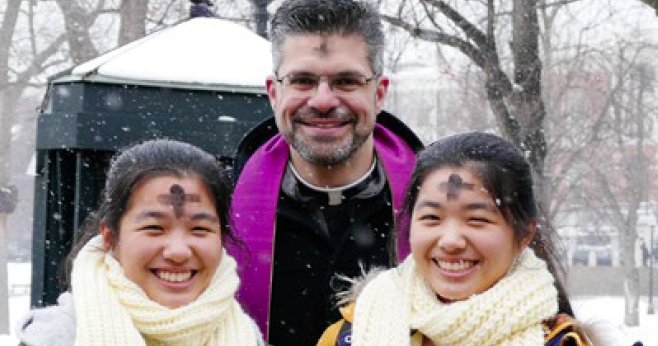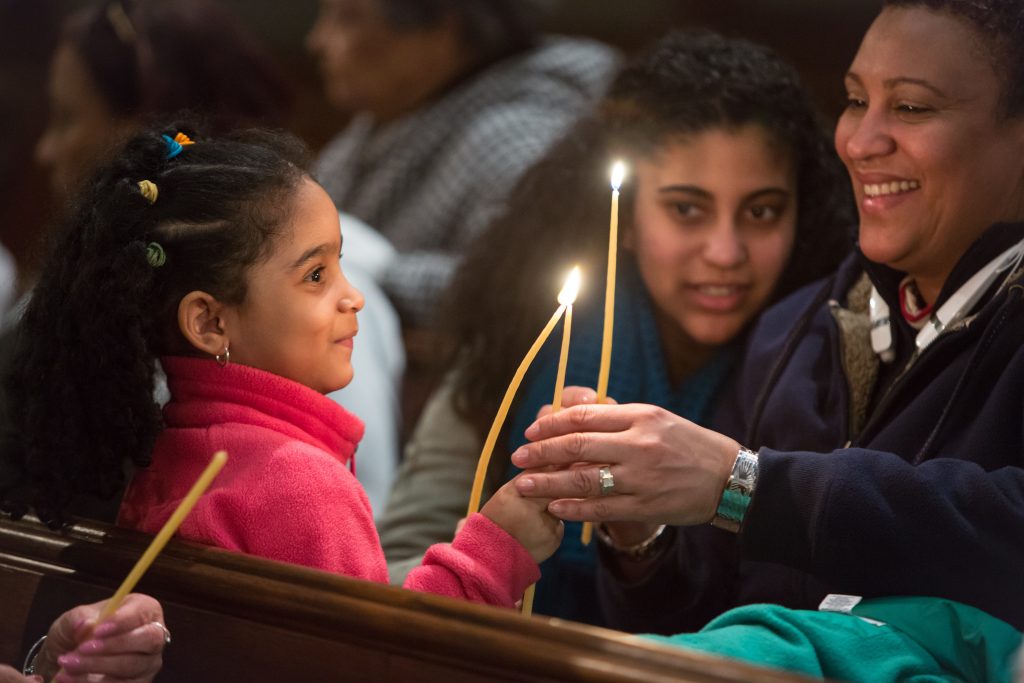
BY MARCELLINO D’AMBROSIO
At age 16, I thought that aspiring to holiness was out of the question. If you really wanted to be holy, I thought, you had to be a priest, nun, or brother. And you had to spend your days doing “religious stuff” like praying, preaching, teaching catechism, or serving the poor. But I liked girls too much and was a budding rock star, so I was disqualified. The best I could hope for was to avoid breaking the Ten Commandments, get to confession when I failed, not miss Mass on Sunday, and toss a few bucks in the collection each week. That way, I could at least make it to heaven after a lengthy stay in purgatory. But true sanctity? That was out of my reach.
Holiness is for everybody
If holiness were about marital status or what you did for a living, I would have been right. But the Second Vatican Council made very clear that my assumptions were wrong. Holiness is not about what you do but with how much love you do it. Holiness is really about sharing in God’s very nature, which is love (see 1 John 4:8). We are talking about a special kind of love here — the love that gives freely of itself, that even lays down its own priorities, interests, and very life for another.
So is holiness difficult to attain? No. It is impossible! At least on our own steam. But that’s the thrill of it all. God invites us into an intimate relationship with him through Jesus. He takes up residence within us and makes it possible to love with his love.
But does holiness depend upon spending all our time in the chapel? Not necessarily. We most often grow in holiness by doing daily, ordinary things with extraordinary love. The Virgin Mary, our greatest example of holiness, was a housewife and a mother. Jesus and his foster father, St. Joseph, apparently spent most of their lives doing manual labor. But when Mary did the wash, she did it for love. When Joseph made a table, he did it for love. When hardship and danger threatened, they met it with faith, hope, and love.
When viewed from this angle, holiness is clearly within reach of every baptized person, regardless of personality type, career, age, race, or marital status. In baptism, we are all reborn with the spiritual muscles necessary to get us across the finish line. Yet these muscles must be nourished and exercised if they are to develop and carry us the full distance. God provides the necessary nourishment in the Word of God and the Eucharist. And he sends us ample opportunities to exercise those muscles.
[Article continues below.]

Lenten exercises
But there’s the rub — many of us don’t want to exert ourselves. It can be uncomfortable. We stretch a bit to finish school, excel at sports, win the heart of the love of our lives. But when it comes to the things of the Spirit, we often act like couch potatoes.
The call to get off the couch and exercise is really what Lent is all about. Some think of it as a time of gloomy brooding on our sins. True, repentance is an important part of Lent and the Christian life in general. But Lent is really a 40-day challenge that is to Christian life what spring training is to baseball. It is a time to go beyond believing in God to actively pursuing him. Lent is a time to train as disciples and achieve new “personal bests” when it comes to faith, hope, and love and all the spiritual exercises that make those spiritual muscles grow!
There are three types of spiritual exercises the Church tradition recommends for us during Lent: prayer, fasting, and almsgiving. The problem is that during Lent we often wind up doing the same thing we did last year and the year before that. This year I challenge you to incorporate some new exercises into your Lenten routine to blast you out of the rut. Here are three specific things you can do to grow in holiness and also encourage your students to do, whether they are adults, teens, or young children.
✱ Fasting “So what are you giving up for Lent?” If there is any spiritual exercise we associate with Lent, it’s fasting. Fasting is really about denying ourselves something good to make room for something better. It’s about creating more space for God in our hearts. Naturally we usually think about food when we think about fasting. No doubt, some of us could stand to cut back our consumption of junk food and sweets. But this is not the kind of overindulgence that is our greatest problem. In today’s world most of us allow ourselves to be oversaturated with media. The average American watches 20 hours of television. When you add TV, radio, music, the Internet, and social media together, most Americans spend more time plugged in to media than they do sleeping.
It’s hard for God to get a message through to us when our heads are filled with so much noise! This Lent I challenge you to carefully look over your media consumption, identify the area that is most out of balance. and cut it back to create more silence, especially at three important times: first thing after getting up, just before going to bed, and before Mass. Create more quiet, and fill that quiet with prayer — reading, perhaps memorizing a psalm to pray first thing in the morning, reading a little Scripture or the life of a saint before going to bed. And before Mass? Did you remember that we are supposed to fast from everything but water for an hour before Communion? Well, add to that an hour of fasting from all media before going to church. See if you don’t find it easier to listen to the readings during Mass and focus on the Lord.
✱ Prayer We all pray. But prayer is food for the soul, and many of us don’t have a balanced spiritual diet. Analyze your prayer throughout the week. How much
of your prayer consists of petition, asking for things for yourself? How much is intercession, asking for things for others? How much is thanksgiving? Our central act of worship is called the Eucharist, or “the Thanksgiving,” for a reason — it ought to occupy the lion’s share of our prayer time. Make a resolution this Lent to increase thanksgiving in your life. Try doing five minutes of giving thanks for everything you can think of as soon as you wake in the morning. First of all, for the very fact that you woke up! For the gift of another day. For running water. For hot water. For heat and air conditioning. Do this before you fret about the things on that day’s to-do list, or before you worry about any problems facing you or those you love. God deserves to hear our thanks before he gets new requests. And thanking him like this has an amazing effect on our mood and attitude.
Thanksgiving produces joy, which, in the words of Teilhard de Chardin, is “the infallible sign of the presence of God.”
✱ Almsgiving The Year of Mercy may be over, but mercy is still very much in style. In fact, it has always been one of the three essential pillars of Lenten discipline, more often known by the name almsgiving. The problem with this traditional word,
however, is that we sometimes get stuck on the idea of giving money. Giving cash to the poor to relieve their suffering is, of course, part of it. But the deepest suffering is something that money alone cannot relieve.
Many people with money and without money suffer the pain of rejection and loneliness. They can be found everywhere — in our families, neighborhoods, churches, and schools. We are preoccupied with our own affairs and our own friends and frequently don’t notice. If we do notice, we often excuse ourselves based on how busy we are.
Try to establish a new habit this Lent. In whatever social context you find yourself, scan the crowd and notice someone who seems left out, alone, perhaps even awkward. Make it a point to reach out to that person with a smile and a greeting and get to know that person a bit, showing sincere interest. Next, introduce him or her to other people you may know in the same crowd. This is a particularly powerful penance to teach to children since there are always unpopular and awkward kids in school and on sports teams. It is a powerful act of courage and love to reach out and befriend them. And this simple act of kindness can change the life of such a child. This is a wonderful way of following Pope Francis’ call to “go out to the peripheries.”
Go for the gold
The 40 days of Lent offer us a choice: We can accept the challenge to train to become spiritual champions, as the saints did. Or we can do a few nominal penances that we abandon after Easter, leaving us much the same as we were on Ash Wednesday. Leon Bloy, a French Catholic writer, once said, “The only tragedy in life is not to become a saint.” Holiness is about realizing our deepest, greatest potential, becoming who we were truly destined to be. What a shame it would be to miss it!
Marcellino D’Ambrosio, PhD, (aka “Dr. Italy”) is a New York Times best-selling author and Catholic speaker. He directs CrossroadsInitiative.com and is an instructor for the Catholic Distance University. For more Lenten ideas, see his book Forty Days, Forty Ways: A New Look at Lent (Servant, 2014) or look for Lent under the seasons resource in his website’s library.
This article was originally published in Catechist, March 2017.
Image credits: Courtesy of George Martell/ Archdiocese of Boston




